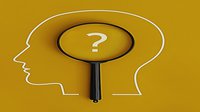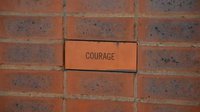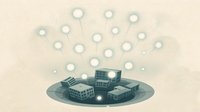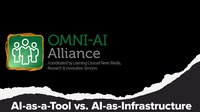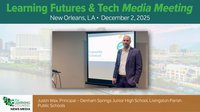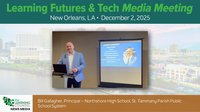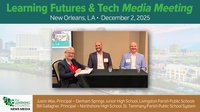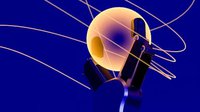During my four decades of education research, I've witnessed educators face disruptive forces that have magnified existing challenges: today we have AI, we've had COVID, we've had decades of education reforms. The American school system has been struggling to adapt to 21st-century demands. Teachers and schools are suffering from reform fatigue, but if you look at the quality of education, it hasn’t improved since the 1970s, probably since the 1950s.
This stagnation isn't for lack of effort. Educators work tirelessly within a system that still largely reflects industrial-era thinking: standardized curricula, age-based cohorts, and assessment models that prioritize content memorization over deeper competencies. These traditional approaches served their purpose in a different era but are increasingly misaligned with the complex, dynamic world our students will inherit.
The limitations of our current model become particularly evident when we consider the diversity of today's learners. Every classroom contains students with different backgrounds, interests, learning styles, and potential career paths. We must acknowledge that no single educational innovation benefits all students, no matter how effective it is in some cases.
This recognition leads to an inescapable conclusion: education must become more personalized. Personalization doesn't mean each student learns in isolation. Rather, it means creating learning environments where individual strengths, interests, and challenges are recognized and addressed. It means shifting from a model where students adapt to the curriculum to one where the curriculum adapts to students.
One such model is Deeper Learning, which was developed at High Tech High in San Diego and will be the focus of the upcoming Deeper Learning New York 2025 Conference, where I am delivering the keynote address. I look forward to challenging attendees to reconsider their fundamental assumptions about concepts such as student agency — the capacity for students to act with purpose and ownership of their learning. Traditional models often position students as passive recipients of knowledge. Deeper Learning approaches recognize students as active participants who can identify problems, devise solutions, and reflect on their learning process.
When students exercise agency, they develop the metacognitive abilities that enable lifelong learning. They learn to assess their own strengths and weaknesses, to persevere through challenges, and to recognize when they need to seek help. These self-regulation skills are increasingly valuable in a world where knowledge evolves rapidly and careers require continuous adaptation.
This shift requires a significant rethinking of the educator's role. Rather than being the sole source of knowledge in the classroom, teachers become facilitators, mentors, and co-learners. They design learning experiences that spark curiosity, provide guidance when students encounter obstacles, and create opportunities for meaningful reflection. This doesn't diminish the teacher's importance—it elevates it by focusing their expertise on the complex work of nurturing human development rather than simply delivering content.
Practical Steps Towards a New Model of Education
Embracing personalization and student agency means reimagining not just classroom practices but systemic structures. Assessment models must evolve to capture the competencies we value. School schedules must provide flexibility for extended inquiry and cross-disciplinary collaboration. Professional development must equip educators with the skills to design and facilitate personalized learning experiences.
These changes represent a fundamental shift in our understanding of education's purpose. In a world of ubiquitous information and increasingly sophisticated artificial intelligence, education can no longer focus primarily on content transmission. Instead, its unique value lies in developing uniquely human capacities: ethical reasoning, empathy, creativity, and collaborative problem-solving.
This transition won't happen overnight. It requires commitment from policymakers, school leaders, educators, families, and communities. It asks everyone involved to question long-held assumptions about what school should look like and be willing to experiment with new approaches. It also asks them to remain grounded in a vision of education that respects each student's humanity and potential. The goal isn't to create more efficient ways of sorting students or to merely prepare them for existing economic structures. Rather, it's to empower young people to shape their own futures and contribute to solving the complex challenges facing humanity.
As I look toward the future, I envision a system grounded in respect, inspiration, and the cultivation of human relationships. By empowering teachers to go beyond being mere conveyors of information and by trusting students to be active agents in their learning, we can create an education system that truly prepares young people for the challenges and opportunities of the 21st century. This shift from prescriptive curricula to personalized growth holds the promise of a more equitable, engaging, and future-ready education system.
About the author
Dr. Yong Zhao is a Foundation Distinguished Professor at the University of Kansas and an internationally recognized scholar in education. He can be reached at yongzhao.uo@gmail.com.


